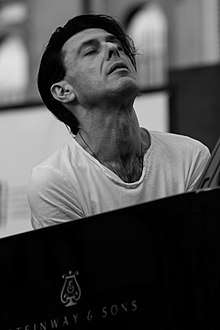Ezio Bosso
Ezio Bosso (Italian: [ˈɛttsjo ˈbɔsso] (![]()
Ezio Bosso | |
|---|---|
 Ezio Bosso playing in concert in 2017 | |
| Born | 13 September 1971 Turin, Italy |
| Died | 15 May 2020 (aged 48) Bologna, Italy |
| Education | Wiener Musikakademie |
| Occupation |
|
| Organization |
|
| Awards | Green Room Award |
| Website | www |
Life
Born in Turin in 1971, Bosso learned to read and play music before he was four.[1] At the age of 14 he became the bass player for the ska/rhythm-and-blues band Statuto. He then focused on classical music, and performed as a double bass player with orchestras including the Vienna Chamber Orchestra and the Chamber Orchestra of Europe.[2] Bosso later abandoned popular music in order to become an orchestral conductor and classical composer, studying composition and conducting at the Wiener Musikakademie.[1] He scored Gianluca Maria Tavarelli's Un amore (1999) and Gabriele Salvatores' Io non ho paura (2003).[1]
In 2011, after undergoing surgery to remove a brain tumor, Bosso started suffering from a neurodegenerative syndrome.[2][3] At first the disease did not prevent him from playing, composing and conducting music.[4] He wrote ballet music, film scores, four symphonies, concertante music, and chamber music including quartets, piano trios and sonatas.[1] He collaborated with soloists such as Mario Brunello and Sergei Krylov,[1] and conducted orchestras including the London Symphony Orchestra.[5] His compositions were featured in various performance art events, and theatrical productions.[6][7][8][9] He also collaborated with theatre directors such as James Thiérrée and choreographers such as Rafael Bonachela.[1]
On 30 October 2015 Bosso released his first solo studio album, The 12th Room. A collection of piano works including Bosso's own Piano Sonata,[1] as well as music by Johann Sebastian Bach, Frédéric Chopin, Christoph Willibald Gluck and John Cage's In a landscape,[10] the album peaked at number three on the Italian FIMI albums chart, along with Adele and Coldplay.[3][11] Some of Bosso's music for piano was compared to the work of Philip Glass.[3]
In 2016 Bosso's music was used by the Royal Ballet for Christopher Wheeldon's Within the Golden Hour, which was first performed by the San Francisco Ballet.[1] He also worked for La Scala in Milan and La Fenice in Venice,[5] and received commissions from the Vienna State Opera, New York City Ballet and Bolshoi Theatre in Moscow.[2]
From 2017, he started focusing more on conducting and composing.[4] In September 2019, Bosso announced that due to his neurodegenerative illness he was losing the control of two fingers and was therefore no longer able to play the piano.[4]
Bosso died in his home in Bologna on 15 May 2020 at the age of 48 after a long struggle with his illness.[12][5]
Awards
Bosso won several awards for his compositions, including the Australian Green Room Award and the Syracuse NY Award, and was nominated for two David di Donatello Awards.[1]
Discography
- The 12th Room (2015)
- ...And The Things That Remain (2016)
- The Venice Concert (2016)
- Ezio Bosso Stradivarifestival Chamber Orchestra (2017)
- The Roots (A Tale Sonata) (2018)
References
- "Ezio Bosso". Royal Opera House. Retrieved 13 February 2016.
- "Italienischer Musiker Ezio Bosso (48) gestorben". musik-heute.de (in German). 15 May 2020. Retrieved 16 May 2020.
- Kübler, Susanne (15 May 2020). "Nachruf auf Ezio Bosso / Er machte Coldplay Konkurrenz". Tages-Anzeiger (in German). Retrieved 16 May 2020.
- Giuffrida, Angela (16 September 2019). "Italian composer Ezio Bosso tells fans: stop asking me to play piano". The Guardian. Retrieved 16 September 2019.
- "Italienischer Klassik-Star Ezio Bosso gestorben". WDR (in German). 15 May 2020. Retrieved 16 May 2020.
- "Biography". Ezio Bosso. Retrieved 13 February 2016.
- "La 'stanza' di Ezio Bosso vince la malattia". Radiopopolare.it (in Italian). Retrieved 13 February 2016.
- Nicoletta Moncalero (2 February 2016). "Chi è Ezio Bosso e 10 cose che non sai sul pianista che con la sua forza di volontà ha vinto la sfida con la musica". Huffingtonpost.it (in Italian). Retrieved 13 February 2016.
- "Ezio Bosso a Sanremo: la malattia e la musica, replica 2^ serata in tv e sul web". It.blastingnews.com (in Italian). Retrieved 13 February 2016.
- "Dirigent und Komponist Ezio Bosso ist tot". ORF (in German). 15 May 2020. Retrieved 16 May 2020.
- "Ezio Bosso FIMI". Ezio Bosso. Retrieved 17 March 2016.
- "È morto Ezio Bosso, il pianista che non ha mai smesso di sorridere". La Repubblica. 15 May 2020. Retrieved 15 May 2020.
External links
| Wikimedia Commons has media related to Ezio Bosso. |
- Official website
- Ezio Bosso unitedagents.co.uk
- Ezio Bosso on IMDb
- Ezio Bosso discography at Discogs
- Italy bids farewell to composer Ezio Bosso wantedinmilan.com 15 May 2020
- Ezio Bosso / Following a bird (The 12th room) on YouTube